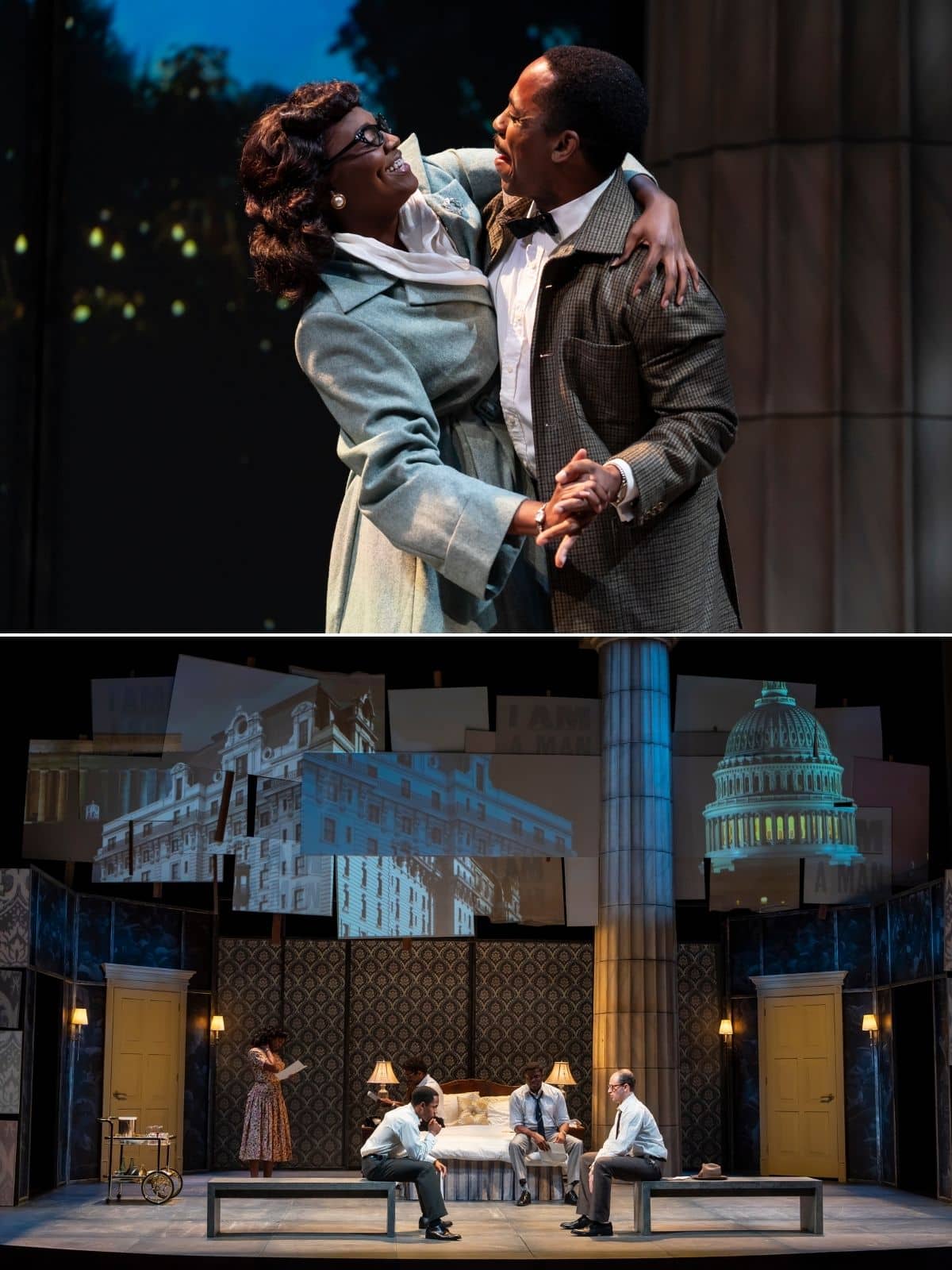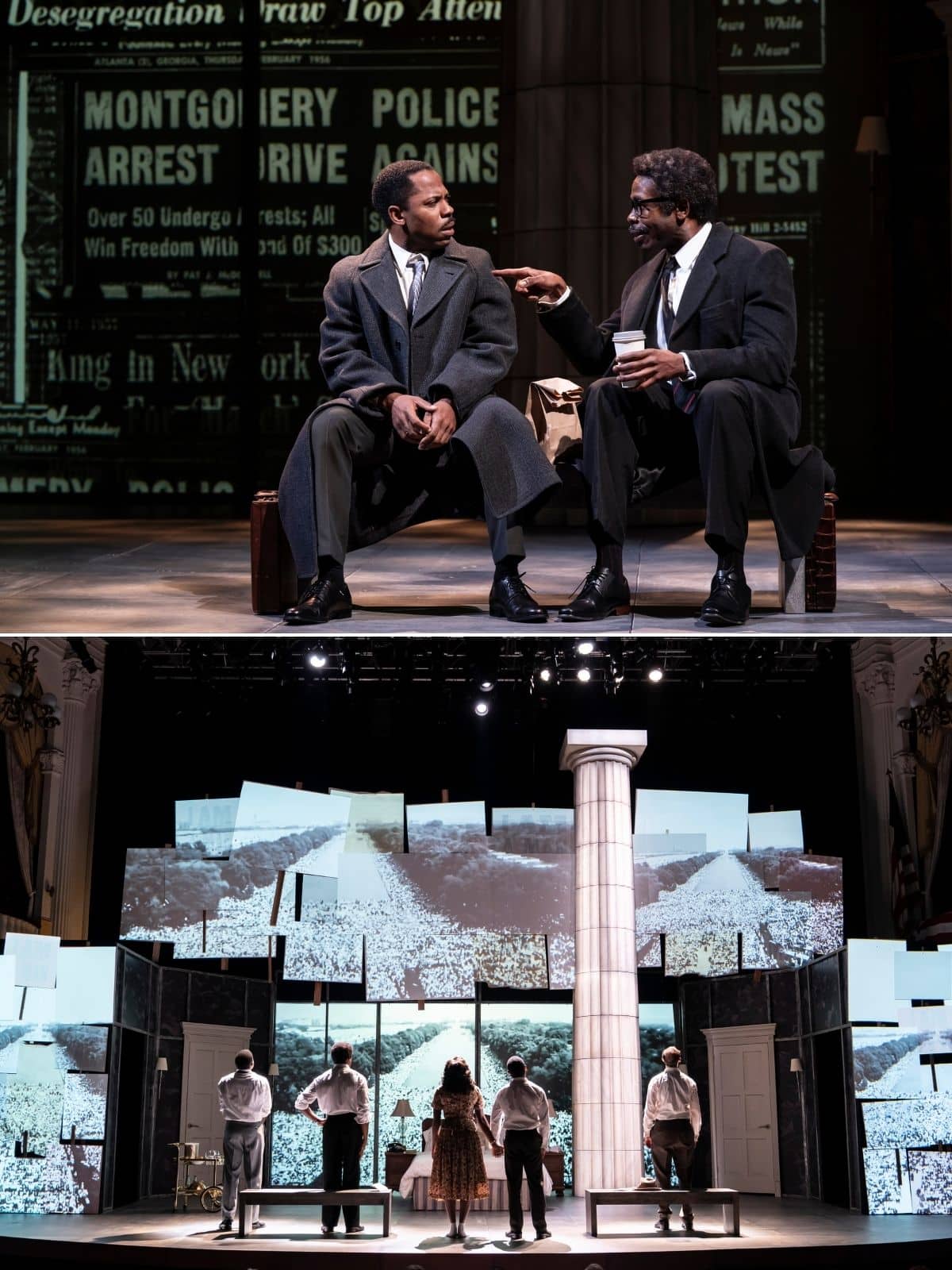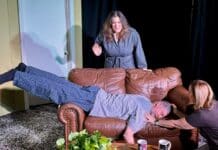Not often in American theater — or not often enough — does a play come along like Chess Jakobs’ The American Five, now premiering at Ford’s. In dramatizing the making of a momentous mobilization for social justice (the 1963 March on Washington, during which Dr. Martin Luther King Jr. gave his historic “I Have a Dream” speech), Jakobs’ powerfully crafted play has the effect of galvanizing in its audience a response that is itself a catalyst for activism for hope and change. In rousing resistance to injustice and inspiring cohesion and connection, the play is a triumph of doing what it’s about.
History looms over the stage in a panoply of period photos and protest posters from the March. (Mona Kasra’s astonishing documentary projection designs will continue to set and inform the scene as the time shifts between 1952 and 1963. Throughout, a replica pillar from the Lincoln Memorial stands centerstage flyspace-high, as if to remind us that what we are witnessing is monumental.)

The script is tight and the storytelling is gripping. It begins with a prologue in a hotel room early morning on the day of the March. (Scenic designer Andrew Cohen and lighting designer Max Doolittle create a succession of places beneath the shifting projections using simple set pieces and scene changes so swift we hardly notice.) Four of the titular Five — Martin Luther King Jr. (Ro Boddie), Coretta Scott King (Renea S. Brown), Bayard Rustin (Stephen Conrad Moore), and Clarence Jones (Yao Dogbe) — are still hashing out the text of Martin’s speech, and it’s not there yet.
Flashback to 1952, when Martin and Coretta met in their twenties and their lifelong bond began. Ro Boddie and Renea S. Brown seem born to play these two roles; their chemistry is incandescent. When in the middle of their courtship, Martin says to Coretta, “I can see you speaking for me when I can’t speak for myself…,” it’s one of many moments in the script when emotion leaps beyond the lines.
In subsequent scenes, we meet the other three members of the American Five who will together, by the end of Act One, become the family that collaborated to make the March.
We see Bayard Rustin give Martin a lesson in nonviolence (Martin, who wanted to keep his gun, needed persuading). It was Bayard who first conceived the March. Stephen Conrad Moore’s performance in the role — with authority, tact, and conviction, particularly when owning and defending Bayard’s gayness — is impeccable.

Suddenly, violence intrudes. It’s 1956, during the Montgomery Bus Boycott, and Coretta and Martin’s home is firebombed. (Projections, lighting, and Kathy Ruvuna’s sound design combine to create a shock that underscores the danger the Kings were in.) Urging Martin to address concerned followers, Coretta tells him, “All you gotta do is open your mouth. God will start speaking.”
Thus, in the aftermath of that shattering bombing, we hear a sampling of Martin’s magnificent oratory:
We will not live and die by the sword. We will live and die by Love and Justice. Shoulders back, chin up, heart open, outright-nonviolent, God Fearing Love and Justice. WE were born for this movement. For this time. On purpose!
We would not be alive right now if this was not our assignment on the moral arc that bends towards justice. We possess the power necessary to withstand where we are.
So we will keep resisting. We will keep boycotting. We will keep loving through this moment in time, because on the other side, the promise of our labor shines bright into the future.
Boddie’s moving delivery does love and justice to the words.
Stanley Levison, a well-off Jewish attorney from New York, is next to join the team. He comes bearing challah and an open heart that wants to help. He cites as his inspiration the principle of Tikkun Olam, “to repair the world.” The character provides moments of warm humor, as when he awkwardly protests that he is not white because he is Jewish. Stanley raises significant funds for the cause, gets Martin out of jail, and turns out to be the wordsmith who polishes the final draft of Martin’s most famous speech. Aaron Bliden plays the complex part pitch perfectly.
The fifth on the team is Clarence Jones, a well-off entertainment attorney from L.A. who becomes a trusted aide to Martin and whose celebrity connections will ultimately bring star power to the March podium. Yao Dogbe excels in the enjoyable role.
Renea S. Brown as Coretta is a marvel of dignity and devotion. The play traces the relationship between Coretta and Martin with a depth and delight that could make for its own play. The solidity of their love is evident (as she tells Martin of the home she keeps, “There is no you out there, without a me, in here”). And when in a conflict over her woman’s rights, she reminds Martin she is “Martin Luther Queen,” she becomes the play’s shero.

At the top of Act Two comes a knockout scene that exemplifies the play’s universality and its power to inspire action. The stage is split. House left is Coretta speaking to a woman’s group at Spelman College; house right is Bayard speaking to students at Howard University. This is a bit of their back and forth:
CORETTA: We are BLACK and we are PROUD. But we need to remember that this is just a checkpoint on the highway to Negro Liberation!
BAYARD: And for all of our white brothers and sisters that are here, that is beautiful but you are not special because you are here!
CORETTA AND BAYARD: None of us are special because we are here!
CORETTA: Standing up for what’s right? For your freedom?
BAYARD: For your neighbor’s freedom?
CORETTA AND BAYARD: Does not make you special!
CORETTA: It makes you a decent human being.
Aaron Posner’s insightful direction warrants an award for activist artistry. The ovation on opening night kept going after the cast took their bows and exited. I was left with the exhilarating feeling of rejoicing in the resistance that the nation needs right now. Had the landmark keeper of Abraham Lincoln’s memory just staged an implicit anti-anti-DEI epic? Yes, I think so. I think that’s what has just happened at Ford’s. Don’t miss it.
Running Time: Two hours and 15 minutes, including a 15-minute intermission.
The American Five plays through October 12, 2025, at Ford’s Theatre, 514 10th Street NW, Washington, DC. Tickets are on sale online and range from $26 to $53. Discounts are available for groups, senior citizens, military personnel, and those between the ages of 21 and 40. For more information, call (202) 347-4833 or (888) 616-0270 (toll-free). Tickets are also available through TodayTix. The production is recommended for ages 12 and older.
A digital program is downloadable here.
Ford’s accessibility offerings (audio-described, ASL-interpreted, sensory-friendly) include closed captioning via the GalaPro App.
COVID Safety: Face masks are optional.
The American Five
CAST
Aaron Bliden: Stanley
Ro Boddie: Martin
Renea S. Brown: Coretta
Yao Dogbe: Clarence
Stephen Conrad Moore: Bayard
ARTISTIC TEAM
Written by Chess Jakobs
Directed by Aaron Posner
Scenic Designer: Andrew R. Cohen
Costume Designer: Cody Von Ruden
Lighting Designer: Max Doolittle
Sound Designer: Kathy Ruvuna
Projection Designer: Mona Kasra
Hair and Make-Up Designer: Danna Rosedahl
Dialects and Voice Director: Rachel Hirshorn-Johnston
NY Casting Stephanie Klapper: Casting
Production Stage Manager: Brandon Prendergast
Assistant Stage Manager: Julia Singer
SEE ALSO:
Ford’s Theatre Society announces cast and creatives for world premiere of ‘The American Five’ (news story, July 31, 2025)



